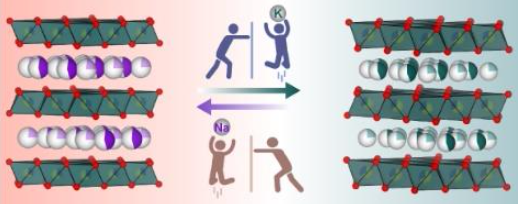Abstract
The emergence of K-ion batteries (KIBs) heralds a promising frontier in energy storage technology, offering the potential for high specific energy density, long cycle life, and robust power capabilities, all while utilizing the abundant resources of potassium. In response to the challenges posed by synthetic intricacies related to K-based cathodes, the effort is directed toward employing soft chemistry (chimie douce) method to unveil a hitherto-unknown P2-type K1/3Co1/3Mn2/3O2 (KCM) layered oxide cathode for KIBs. Comprehensive analysis using diffraction, microscopy, and spectroscopy tools reveals the ion exchange reaction proceeds through overlay ordered structure formation mechanism. The as-prepared KCM material serves as a ≈2.9 V positive K+ insertion host. Further, it showcases an exceptional structural reversibility, robust cycling performance with ≈100% Coulombic efficiency even after 100 cycles, and maintaining electrochemical stability even at elevated temperature (c.a. 40° and 50 °C). The KCM cathode exhibits in-plane Co–Mn ordering and solid-solution redox mechanism during (de)potassiation. Combining first-principles calculations with experimental tools, this research demonstrates the efficacy of ambient ion-exchange route in stabilizing promising cathode materials for KIBs. This innovative synthetic approach not only streamlines synthetic complexities, but also holds significant implications for the advancement of KIB technology for stationary energy storage.
